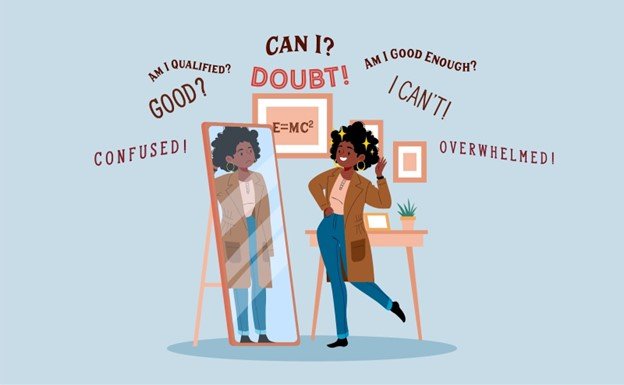🌿 Unmasking Imposter Syndrome: Why You Feel Like a Fraud (And How to Gently Heal It)
Have you ever looked around a room, a Zoom call, or even at your achievements and thought:
- “I don’t belong here.”
- “They’re going to realize I have no idea what I’m doing.”
- “I’m not as capable as they think I am.”
If so, you’re not broken. You’re not alone. You might be experiencing something called Imposter Syndrome.
Imposter Syndrome can often feel like we are hiding behind a mask.
💭 What Is Imposter Syndrome?
Imposter Syndrome is a psychological pattern characterised by doubts about your accomplishments and a persistent fear of being exposed as a fraud, even when there is clear evidence of your skills or success. It often affects high achievers, creatives, entrepreneurs, caretakers, and professionals, but anyone can experience it.
It’s not about whether you’re competent; it’s about how safe you feel in owning your worth.
🧠 CBT Insight: What’s Happening in Your Mind?
From a Cognitive Behavioural Therapy (CBT) perspective, Imposter Syndrome is often driven by:
All-or-nothing thinking: “If I’m not perfect, I’m failing.”
Discounting the positive: “They’re just being polite.”
Catastrophizing: “If I speak up, I’ll be exposed.”
These distorted thought patterns shape our self-perception and keep us stuck in cycles of self-doubt and anxiety. In CBT, we work on identifying and gently reframing these thoughts so that they no longer hold power over us.
💬 Counselling Insight: Where Did This Belief Come From?
Imposter Syndrome doesn’t appear out of nowhere; it can be rooted in:
Childhood messages about needing to prove your worth
Unspoken family or cultural expectations
Past experiences where vulnerability was met with criticism or shame
Counselling provides the space to explore these origins with compassion, allowing us to rewrite old narratives that no longer serve us.
🌸 A Holistic Healing Approach
At The Aromacee Approach, I believe that healing Imposter Syndrome requires support for not just the mind, but the body and soul as well. Here’s how we can begin:
🕯️ Rituals & Sensory Anchors
Try diffusing frankincense for grounding before a presentation.
Use lavender or bergamot to calm your nervous system.
Carry rose quartz to open your heart and soften inner criticism.
🖊️ Journaling Prompts
“What evidence do I have that I’m doing better than I think?”
“Whose voice am I really hearing when I doubt myself?”
“What would I say to a friend feeling like this?”
Journal Writing can be very useful
🧘♀️ Nervous System Support
Imposter Syndrome can feel like an inner alarm bell. Breathwork, gentle stretching, mindful movement, or nature walks can help bring your body back to safety—so your mind can follow.
💚 Final Thoughts: You Deserve to Take Up Space
Imposter Syndrome doesn’t mean you’re broken; it means you’re human. Your voice, presence, and contributions are valid—even when you doubt them. If you’re tired of second-guessing yourself, I invite you to explore therapeutic and holistic support tailored to your needs. Whether through one-on-one sessions, guided journaling, or our growing self-help resources, you don’t have to walk this path alone.
🌿 Learn more about therapy, CBT, and holistic well-being at: www.aromacee.co.uk
📩 Or follow me on Instagram @aromacee for daily encouragement and tips.
🎧Listen to the Aromacee Approach podcast on Spotify and Apple Podcasts



